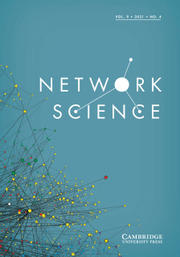Article contents
Tenure trumps title: Assessing the logic of informant selection in inter-organizational network research
Published online by Cambridge University Press: 17 September 2019
Abstract
Researchers collecting survey data on inter-organizational networks typically choose a single informant with the most senior job title in each organization from whom to obtain a report of the organization’s inter-organizational ties. This approach to informant selection is based on the logic that greater seniority confers greater knowledge of inter-organizational relationships. The present study investigated the wisdom of this logic, using data in which multiple informants’ reports of inter-organizational network ties were collected for each organization. We calculated the degree of agreement in network reports between the informant with the most senior job title and a second informant in the organization. To determine if alternative criteria to seniority serve as better approaches to informant selection, we assessed other potential predictors of agreement in informants’ reports. Results indicated that (1) informants’ perceptions of the network differed significantly according to job title, suggesting little agreement between senior informants and their more junior colleagues; and (2) greater informant tenure in the network and industry were associated with greater agreement among informants. These results call a common data collection practice into question and suggest that tenure may trump title as a criterion for informant selection in inter-organizational network research.
- Type
- Original Article
- Information
- Copyright
- © Cambridge University Press 2019
Footnotes
Amanda M. Beacom was affiliated with Boston College and University of Southern California when portions of this research were conducted.
References
- 1
- Cited by


